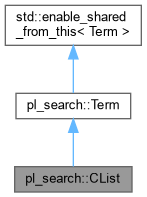Represents a list of terms. More...
#include <clist.hpp>
Inheritance diagram for pl_search::CList:

Collaboration diagram for pl_search::CList:

Public Member Functions | |
| CList (std::list< TermPtr > &elems) | |
| Constructs a CList with the given elements. | |
| std::string | repr () const override |
| Returns a string representation of the list. | |
| bool | isEqualTo (Term &other) const override |
| Checks if the term is equal to another term. | |
| bool | isLessThan (Term &other) const override |
| < operator for a CList and a Term | |
| void | addElement (TermPtr element) |
| Adds an element to the list. | |
| const std::list< TermPtr > & | getElements () const |
| Returns the elements of the list. | |
 Public Member Functions inherited from pl_search::Term Public Member Functions inherited from pl_search::Term | |
| virtual TermPtr | dereference () |
| Dereferences the term. The default is to return a shared pointer to term itself. | |
| virtual bool | unifyWith (Engine *engine, TermPtr t) |
| A hook for unification of user-defined classes. Only override this method if you want to unify user-defined classes. | |
| virtual bool | is_var () |
| Checks if the term is a variable. | |
| Term () | |
| Default constructor. | |
| virtual | ~Term () |
| Virtual destructor for proper cleanup. | |
Protected Attributes | |
| std::list< TermPtr > & | elements |
| The elements of the list. | |
Additional Inherited Members | |
 Protected Member Functions inherited from pl_search::Term Protected Member Functions inherited from pl_search::Term | |
| virtual Term * | deref_term () |
| Similar to dereference but returning the "raw" pointer. | |
Detailed Description
Represents a list of terms.
CList objects replace Prolog lists for efficiency. The internal list is mutable, so care must be taken when using CList objects. For example, it might be necessary to copy the list before passing it to a function that might modify it or when binding a variable to a CList object.
Constructor & Destructor Documentation
◆ CList()
|
inline |
Constructs a CList with the given elements.
- Parameters
-
elems The elements of the list.
Member Function Documentation
◆ addElement()
|
inline |
Adds an element to the list.
- Parameters
-
element The element to add. Warning: the engine does not backtrack over adding elements to a CList.
◆ getElements()
|
inline |
Returns the elements of the list.
- Returns
- A reference to the list of elements.
◆ isEqualTo()
|
inlineoverridevirtual |
Checks if the term is equal to another term.
- Parameters
-
other The term to compare to.
- Returns
- True if the terms are equal, false otherwise.
Implements pl_search::Term.
◆ isLessThan()
|
overridevirtual |
< operator for a CList and a Term
- Parameters
-
other The term being compared
- Returns
- True if the this CList is < other, false otherwise.
Implements pl_search::Term.
◆ repr()
|
inlineoverridevirtual |
Returns a string representation of the list.
- Returns
- A string representation of the list.
Reimplemented from pl_search::Term.
Member Data Documentation
◆ elements
|
protected |
The elements of the list.
The documentation for this class was generated from the following files: